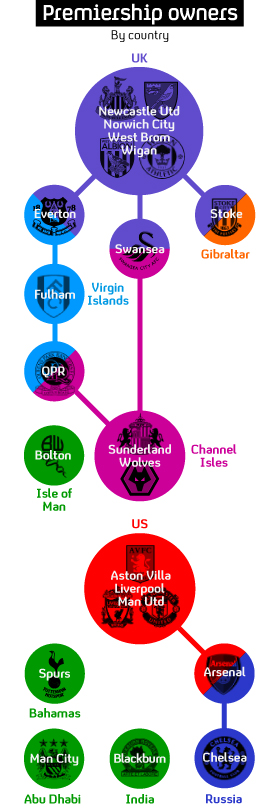How to buy a fooball club
 Alex Thomson
Chief Correspondent
Alex Thomson
Chief Correspondent
A year-long undercover investigation by Dispatches finds that some of the most cherished clubs in English football are being touted for sale like used cars, writes Alex Thomson for Channel 4 News.

Our investigation into English football ownership began against a backdrop of unprecedented debt and huge question marks hanging over who actually owned certain football clubs.
There was the notorious case of officials connected to Leeds United being either unable or unwilling even to disclose exactly who owned the club, when quizzed by MPs.
And there is the opaque money from the far east and elsewhere that has been used to prop up football clubs crippled by unsustainable debt, with attempts to discover the real source of any cash lost in a maze of offshore accounts.
Conflicts of interest
Net debt in the Premier League is more than £2.5bn according to the latest accounts available, which spells it out clearly. The £700m comes direct from Greg Clarke, head of the Football League. There was clearly something big to investigate.
Many loyal football supporters who follow their club year in, year out are becoming increasingly anxious about the obscure or even downright invisible foreign owners of their clubs.
There are conflict of interest question marks hanging over some investment funds that advertise themselves as keen to invest in football clubs, players, sporting academies and other football related ventures. Leading figures in the game have expressed concern about this, particularly when figures with connections in the game add to those interests.

Streets of Bangkok
The story begins in a far east bar that carries the name of a major UK club. There, in the steamy streets of Bangkok, we have come, posing as businessmen interested in investing in English football via one of the new “football funds” which exist for precisely that purpose.
Our immediate point of contact is one of the biggest names in English football as a player – now working for a major Premier League club. Drinks are ordered. Shirts are exchanged, given to our Indian would-be businessman-buyer, to take home for the children.
What is startling is that, as our undercover reporter lays out his card and intentions, nobody on the other side of the table makes the slightest attempt to check him out, see the colour of his money, investigate his background.
He could, pretty much, be anybody. And of course, in reality “Mr Gupta” might as well be anyone in this world of self-regulated ownership. At this level, things are almost pathetically easy.
Buying in to make a profit
Over time we are offered a choice of nine Football League clubs – and these are big, historic names, all offered to us up for grabs.
The mood is jovial but concentrated, business-like – there are potentially big sums in play here. We make it clear we are carpet-baggers, buying in to make a quick profit in a very few years, before getting out while the going is good. That’s no problem at all, they say: “We get it.”
We decide to keep our cards close and go back for another series of meetings in Bangkok a few weeks later. At these meetings everything has changed. This time we start in a lawyers’ office, and the puppetmaster of this operation is here in person.
He claims some of the biggest names in English football as close personal associates over many years. He has the photos in his laptop to seemingly prove it. To our astonishment, he even gets one of them on the phone to speak to us.
Eventually we are offered a club to buy. One of the biggest names in the football league, a club with a large fan base, a rich heritage but, like so many outside the Premier League, falling on hard times and desperate for a sudden cash injection.
Still nobody has made any apparent attempt to ask us who we really are or what we do. Where has our money really come from? It appears such questions simply do not matter.
Buying a second club
We get down to business. With one club in the bag it’s time to go for the big question. We send in “Mr Gupta” in person to clinch the second deal, to buy a second club, which is completely against the rules.
It is clear we are pushing at an open door. When we ask about how we can possibly buy another club, the CEO says: “The good thing about a football fund is, you can buy it and nobody will know.”
They joke about how funny it will be when one team plays another in England.
Incredibly, they then joke about how funny it will be when one team plays another in England and everyone thinks it’s a fair competition.
“So which team are you going to support? Team A or Team B?” And they laugh.
“Both!” says another, to more laughter, and then another says: “That’s the one where they draw each other in the FA Cup.”
It breaches the rules. It strikes at the heart of the game. And football’s highest authorities admit investors like this could get away with it.

‘He could manage the manager’
Our new-found business partners make it clear they will be able to offer us a front organisation to disguise the fact that we are about to own two big clubs.
We ask about the manager of these clubs. Is it possible for one famous face helping to put this together to manage our team? He declines. He already has a job with a British club which prevents him doing this.
But a solution is offered. “He could manage the manager,” we’re told. “Are you okay with that?” we ask. “Yeah, fine.”
That remarkable statement, which strikes at the heart of everything that is fair in sport and competition, is allowed to hang in the air and is challenged by nobody.
“Obviously, we need to keep this anonymous,” says one. “We need to stay as much under the radar as we can and buy the clubs. We don’t want anybody blocking us. We’ve got to be careful.”
Great British football takeover
And they are careful. The legal side is taken care of. Any worries about fit and proper test of ownership are thought through.
What is clear is that they have all the paperwork in front of them to make his happen. We are to buy two English clubs and could have taken our pick of more. The legal documentation arrives back in London, Everything is ready to roll for the great British football takeover.
Lord Triesman told Dispatches after viewing the film: “I expect the staff, including the most senior staff in the coaching side, including the manger, to be the people who run that football club for the benefit of that football club and for its fans.
“And any system that tries to get round that, particularly in the environment of multiple ownership, potentially destroys the fundamentals of competition in football.”
It all begs the clear question: if these men could get away with all this, then how do we know it has not already happened? We don’t!
Watch Dispatches: How to Buy a Football Club, Channel 4 Monday 18th July at 8pm